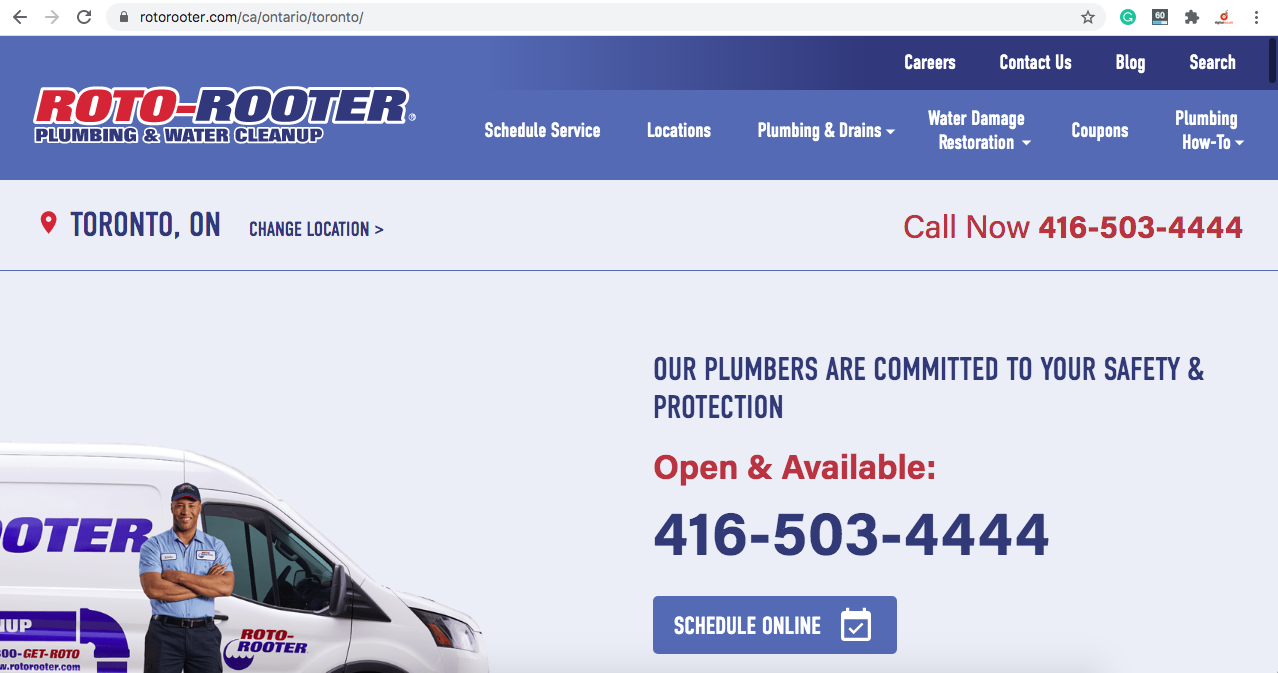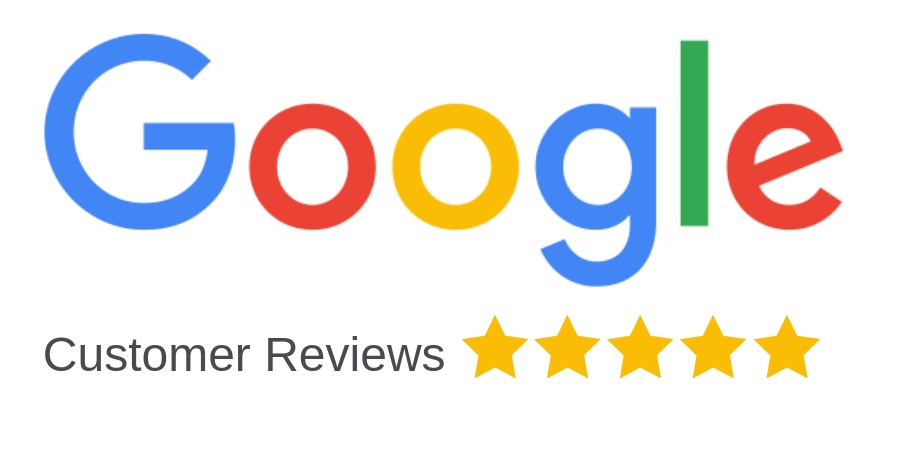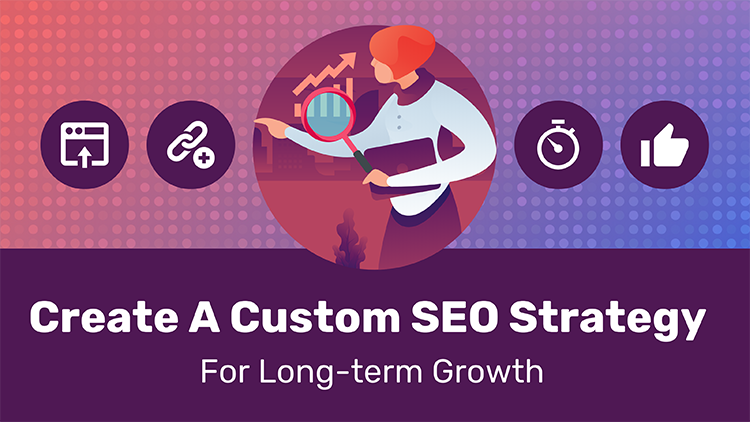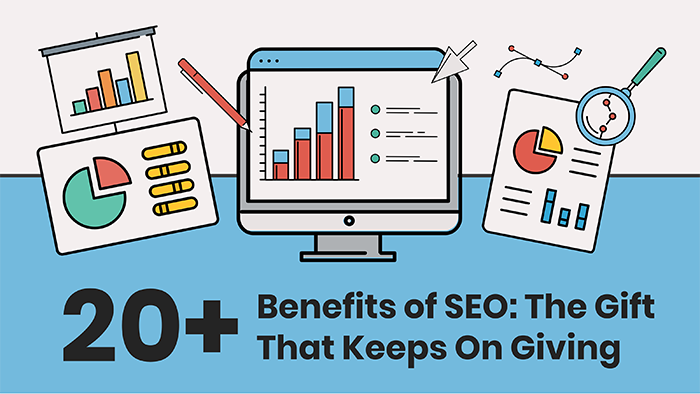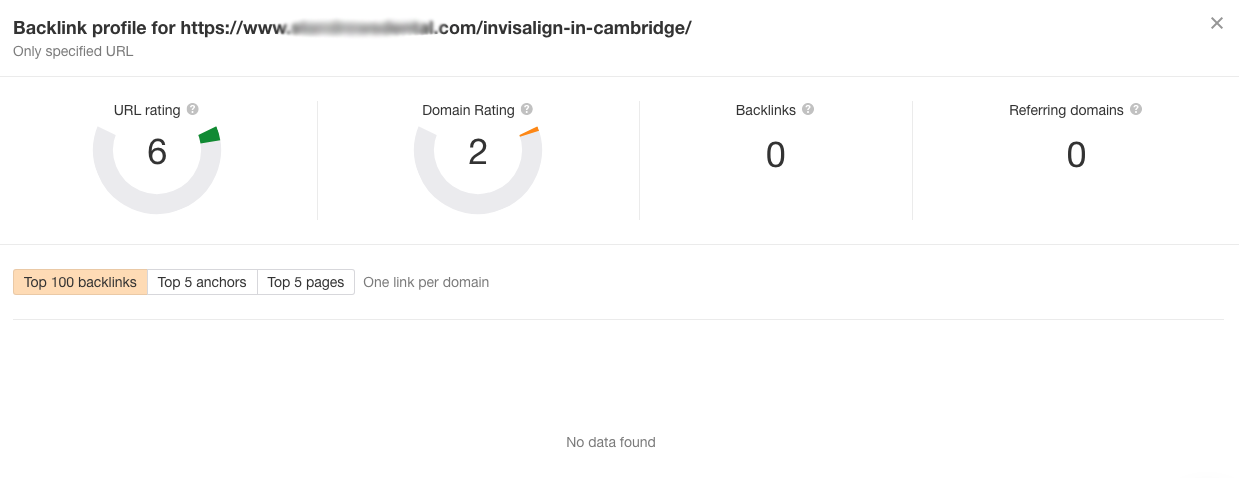What Is A Location Page And How Do I Publish One?
A location page is a location-specific page that ranks in a city, state, province or country that is built specifically for the location you target. Location pages are used to improve your local presence in another location.
If your business is capable of providing service to multiple areas (service area business or multi-location), this is an excellent method of creating a local presence in the city you’re targeting.
Let’s say, for example, you’re a mobile mechanic. You have a garage located in Scarborough ON, however, you’re able to service the Greater Toronto Area.
Rather than optimize for searches just within Scarborough, you can build a location page to target searches for Toronto, or any other city surrounding Toronto as well.
Here is an example of a mobile mechanic location page for Toronto.
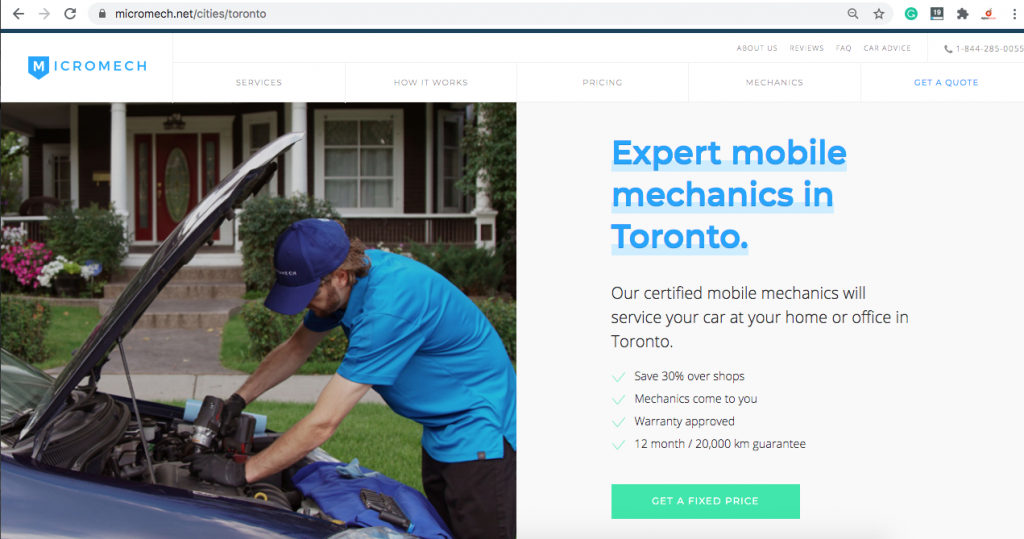
Here is another page on the same site for Calgary.
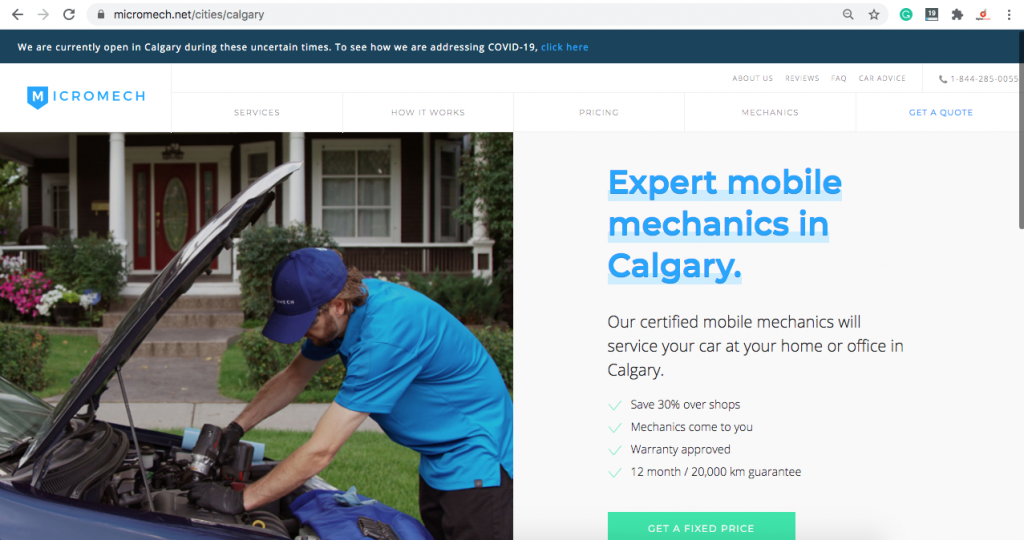
This company is taking advantage of ranking in multiple cities to expand the areas in which they can do business. Here is a look at the service areas this busienss covers:
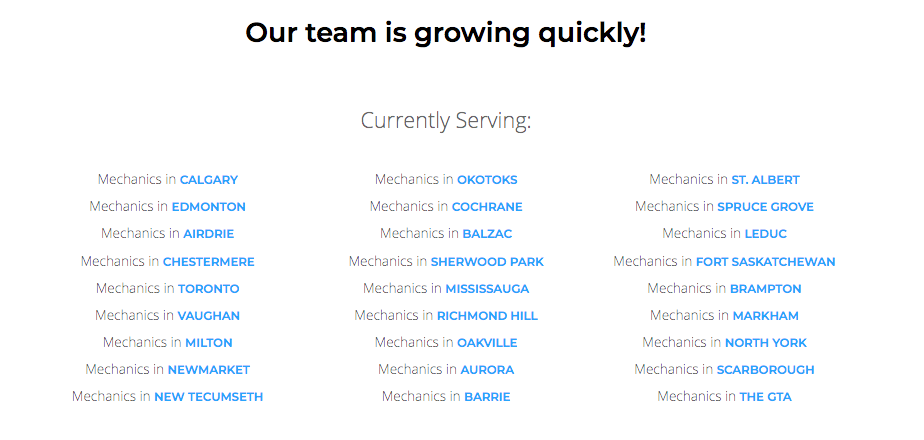
Whenever a user in another city searches for your service, your location page will have a much better chance of ranking on the first page.
Location pages are an aspect of local search engine optimization to expand your company’s reach and increase the revenue your business makes.
Why be tied down to one location if your company is capable of doing more business in more cities? It’s a similar concept to setting up franchise locations except your using web properties to stake your claim in other cities.
9 tips for publishing location pages
Location pages share similar characteristics that allow them to rank highly. To see your location page rise in the search results, address the following areas:
Target the most effective keyword
It’s impossible to optimize a page without doing any research on the keyword you’re targeting. Keyword research provides insight into the value of your target phrase and the level of competition you will be facing.
If you’re going to go through the trouble of ranking a location page, make sure it’s worth it. Your target phrase should drive enough relevant traffic to generate revenue. Choose the best keywords to target by going through the proper steps for keyword selection.
Identify and satisfy the intent of the search
Establish the true intent of the search phrase to understand the type of traffic that is driven to your site. Keyword research helps to establish what visitors are looking for when they type in a particular search phrase. When your page satisfies the intent of the search there’s a better chance of ranking highly in the search results.
Are the pages that currently rank for your keyword informational, transactional, navigational or commercial?
The chances are most location pages will need to include a bit of everything. To completely take your prospects from and introduction to conversion, requires careful content planning.
Each competing page that ranks is major clues to how search intent is begin defined by search engines. This typically is a direct correlation to what users are looking for as well.
Optimize your page in all the right places
Optimize your page to target a specific search term that includes the city you’re targeting. Include the target keyword in the page title, URL and a few times within the content. Any images should have the keyword and keyword variations in their alt tags.
This is the bare minimum for basic on-page optimization, however, it goes a long way in local SEO. You can enhance your on-page SEO a number of ways but using the basics is a must for every location page.
Make your page hyper-local
Make your page hyper-local to the target city. If you can mention landmarks, or make city-specific references, it will tie your page to the locality. Link out to local sites and resources. Prove to search engines that you’re familiar with the area and cater to local residents.
Post name, address and phone number on your page
If your company has a physical location within the city, post the NAP details on the location page.
For service area businesses, a unique phone number with the city area code will help to optimize your page.
Use structured data markup
Use structured data markup wherever possible to help search engines better understand your page. This will also make your page more attractive to users and entice more clicks if you can generate rich results.
FAQ structured data markup is an example of a rich result. This snippet gets users to understand more about your business directly from the SERP. The extra space your search listing takes up attracts more attention and pushes your competition down the page.
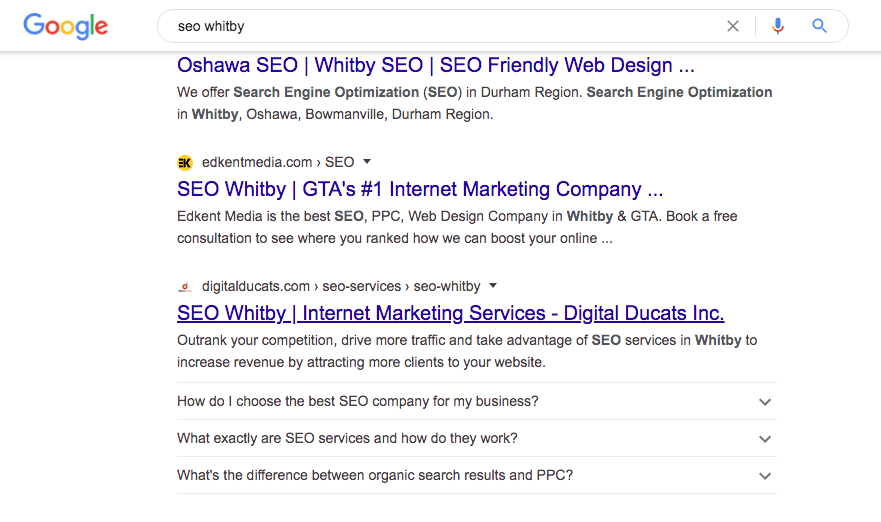
This type of rich results allows you to link to interior pages of your site. Help people to better understand what you can do for them with your product or service.
Reviews are another major type of rich result that is insanely popular.

Structured data markup makes your search listing more attractive with rich snippets. Although Schema.org has over 800 different categories to use, Google only offers about 30 types of rich results.
Implement structured data markup to increase the click-through rate and drive more traffic to your site.
Use an internal linking strategy
The linking strategy you use to build the authority of your page begins internally. Use descriptive anchor text and link from related pages to your location page. This builds the profile and authority of your location page.
In the same respect, link from your location page to relevant pages on your site. The links should help your visitors understand what your business offers.
This linking structure forms a basic topic cluster and highlights your location page as a pillar within your site. This linking structure will contribute to a more authoritative location page.
Build external links carefully
Use extreme caution when building the ranking ability of your location page with external links.
SEO best practices are to build links as natural as possible. Any unnatural link building patterns will be ignored and possibly have adverse results on your location page.
For example, it’s common for local businesses to have backlink profiles mainly comprised of directories and review sites. Local links will have the greatest impact on your location page.
You can indirectly link to your location page by linking to blog posts that in turn link to your location page. The link equity is transferred as a second-tier link. This builds more overall authority to your site and helps power the authority of your location page.
Publish local content
The content you publish on your blog has a large impact on how your site is viewed in a specific city. Search engines will take city-specific posts into consideration when they assess your site. Create blog posts that have very location-specific references to create more relevance in the city you’re targeting.
Link your city-specific blog posts to your location pages to include them in your topic cluster. This ensures that search engines connect your local SEO content to your location page.
Use location pages to build an empire
The beauty of creating an effective location page is that your business is able to expand the market in which it competes. You’re company is essentially setting up a new branch in another city by creating a page that ranks for your keywords.
When growth is your goal, create location pages to increase the traffic your site generates with visitors from different cities and locations.
Local SEO Content: Improve Your Local Presence
Want to rank for searches within a specific city? The solution is simple; Be city-specific with the content you publish. Local SEO content is an excellent way to get search engines to recognize the city in which you want to improve your local search presence.
What is local SEO content?
Local SEO content is content that is optimized for a city-specific keyword. The content within your page will identify unique elements that relate the content to a specific city.
By identifying popular landmarks, places, addresses or anything unique to the locality, your page and your website become more closely associated with searches that originate from your target location.
There are a few different types of content that work well to optimize for your city, county, state or province. Here are seven of the more popular types that you’re most likely to see used on a website.
Expert round up from professionals in your city
An expert roundup is a form of evergreen content where you combine the quotes from a group of professionals. Confining the area in which you collect your quotes will make your content local to your city.
You can generate a lot of good local backlinks from different local experts that will in turn boost the competitive ability of your website within your city. People will link to your content when they are featured in it.
This type of content can be combined with an infographic to really improve the likelihood of your project being shared within your industry. An example of this is 12 Web Design Trends In 2020 By Toronto Experts.
In this example, 18 experts shared their opinions on the top web design trends for 2020. The infographic was shared and used on a few of the participant’s sites, which accounted for a boost in local traffic.
You can read the details in a local SEO strategy case study.
Local client surveys
Create a survey for your clients that will help you understand how to serve them better as well as create extremely targeted content. Original data is one of the most valuable assets you can obtain in terms of content creation. Focus your survey on your local clientele to create highly optimized content.
One of the benefits of generating your own data is that you can promote your content to other companies in your niche. When you have something no one else it becomes a linkable asset. Other websites will be much more likely to use your data as a resource when the information is coming straight from your own research.
Host a local event
If you’re planning on hosting an event, no matter how small or large, you should be writing about it on your blog. Include the name, address and times of the event and use structured data mark up on your page.
Hosting your own local event creates an opportunity to publish highly optimized content to your city. As search engines index your site, the amount of local content you’ve published contributes to a stronger local presence.
Sponsor a local event
If your business covers service areas or you simply don’t have the resources to host an event, there are plenty of opportunities to sponsor a local event.
Simply getting a link to your website on the sites that are promoting the local event is worth the local optimization points. These events should take place in the city you’re optimizing for and you can write about the event on your blog to promote awareness.
Here’s an example of a Meetup group in Toronto that has six sponsors listed on their Meetup page.
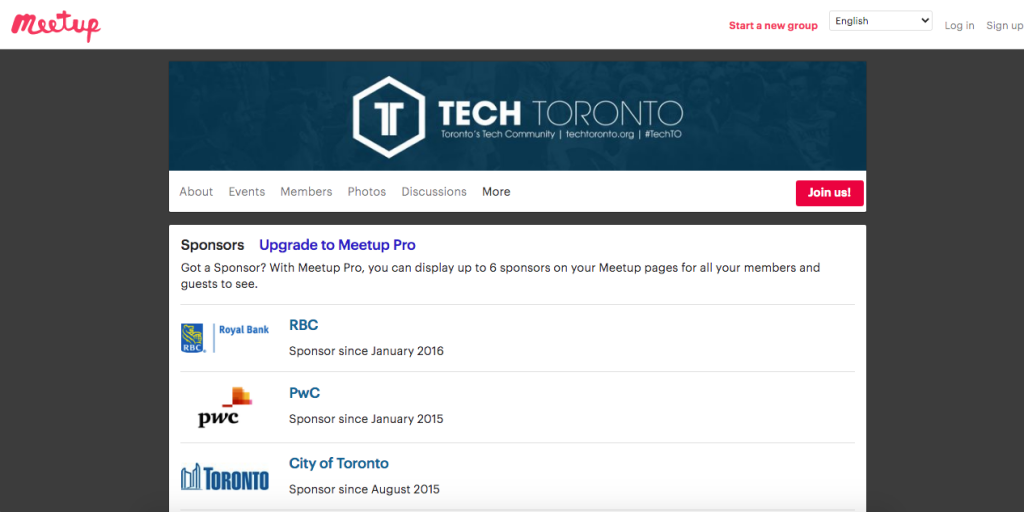
You can look for opportunities to sponsor events on sites like Meetup, Eventbrite and your local chamber of commerce.
Location pages
If your website operates in multiple locations, a location page for that city will give you the best opportunity to rank highly for city-specific search terms.
Location pages can be optimized to provide more relevance to the target location. With a page dedicated to a specific city, you can optimize for the city in the metadata as well as include city-specific references within your content.
Here’s an example of the Toronto location page for Roto-Rooter. You can see the URL includes the province and city. The title (h1 tag) is also Toronto, On.
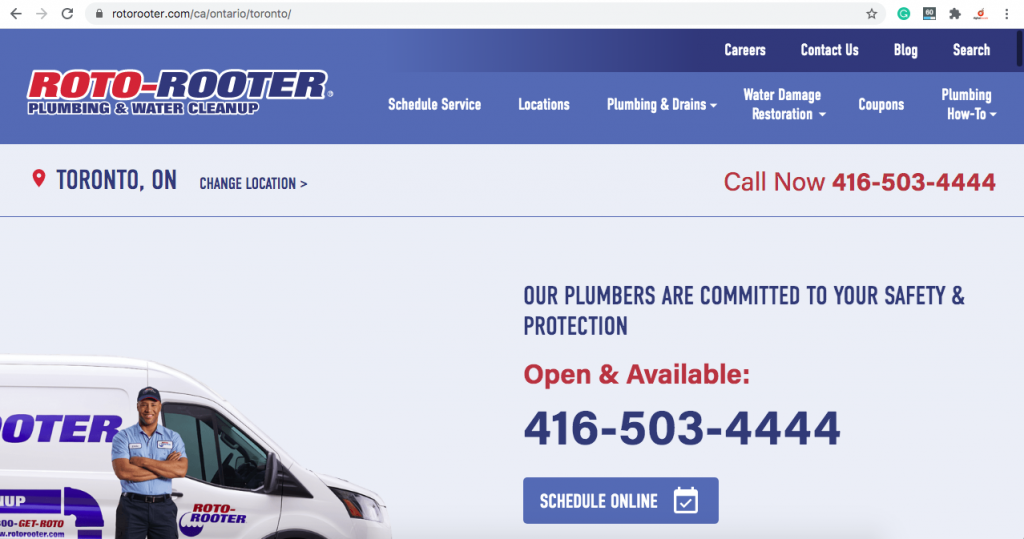
If you have an address located within that city, your NAP details should be included in your on-page optimization. Including structured data mark up will ensure search engines know your page is dedicated to a specific city.
Write about local events and activities
Publish content on local events and activities that relate to your business. Give your audience updates on current events that affect your locality and how it relates to your business.
Content that makes city-specific references and links builds your local notoriety for both users and search engines.
FAQ page and/or section
Publish a frequently asked questions page to win positions on the SERP (search engine results page) and drive more traffic to your site.
You can use a FAQ page to target featured snippets and PAA boxes. The sweet spot to appear in these SERP features are answers to commonly asked questions that fall within the 40-60-word count.
Use h-tags to mark up your questions.
You can even add FAQ sections to location pages or any page where it makes sense. Use structured data to mark up your content. This will make your page eligible for rich results when it ranks on the first page of Google.
Create a local SEO content strategy
Every business will have different opportunities available for working out an effective local content strategy. Identify the best traffic opportunities as well as the best link building opportunities to harmonize your efforts.
Develop a strong local presence to capitalize on some of the highest converting traffic available. Make sure your content includes a local element to build your brand recognition in your locality.
How To Get More Google Reviews
Defining a simple review strategy can help you get more Google reviews. To get the most positive reviews of your business it comes down to two major factors; the service you provide your clients and the review strategy you implement for encouraging reviews.
Google reviews promote strong ranking signals for localized search results.
The truth is people typically leave reviews if their experience was either extremely pleasant or utterly horrible. A mediocre experience is quickly forgotten and the urge to share is somewhat non-existent.
Not every customer interaction will hot one extreme or the other so it becomes necessary to implement a review strategy to encourage reviews.
To get more reviews on Google you will need to:
- Provide outstanding service
- Ask your clients for reviews
- Make it easy for them through reminders and review links.
- Respond to all of your reviews
Provide the best customer service possible
Outstanding service is the best way to get the most positive reviews of your company. The level of effort your business puts forth in this department will be your customers’ testament to the quality you provide.
This aspect sets your company up for each and every other way to encourage customers to leave a review.
Ask the client in person
Asking in person is an effective way to gently guide your customer to leave a review. The timing can be more strategic where at the end of a transaction you or your employees can suggest that they leave a review if they were satisfied with the way things went.
Asking in-person applies to both in-store experiences as well as over the phone customer service calls.
Send a review link via email
Make it a point to thank your clients by sending an email letting them know you appreciate their business. At the end of the email, ask them to kindly leave a review.
Provide a link to make things easy and take them directly to your review page.
How to create a link for customers to review your business on Google
Time needed: 3 minutes
How to create a Google review link using a desktop computer
- Go to your Google My Business profile
Click Home on the left side of your navigation menu.
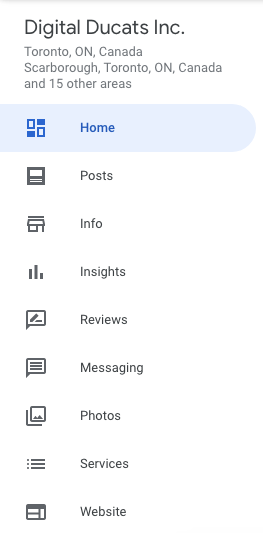
- Find the box that says Get more reviews
Click on the button that says Share review form

- Copy the link generated with your short URL
If you haven’t created a short URL you may be prompted to do so before getting your link to review your business on Google.
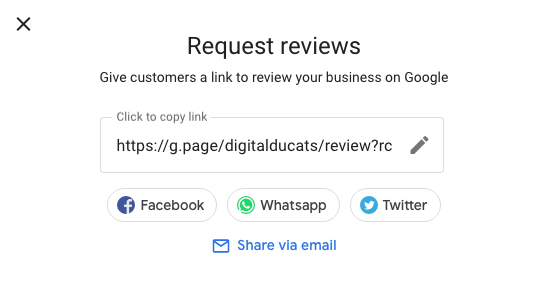
Respond to each type of review
Think of reviews as additional ways to promote your business. Reviews are simply another way that people can learn about your business. Build. your brand and your reputation by responding to as many reviews as possible.
Reviews are a powerful marketing tool that highly influence purchase decisions. Make the most of them by putting your best foot forward for future clients and customer loyalty.
Treat negative reviews as marketing opportunities
It’s imperative to respond quickly to negative reviews. It’s bound to happen from time to time that someone will not get what he or she wanted from your product or service.
Never ignore a negative review as it is best remedied by a timely response.
Responding to a negative review will give you an opportunity to show people how you deal with an unsatisfied customer.
You can take the venom out of a bad review, by stating your side of the story and offering a solution (or apology if it’s required).
People are much more forgiving of a negative review when they see your side of the incident and how you handle a disgruntled customer.
Show your appreciation for positive reviews
When a client leaves your positive review they are helping your business. Show them appreciation by responding to their review. Not only does this make them feel appreciated but it shows other people that you value their business.
There are some people who might feel they should be thanked when they leave a positive review for your business. Cater to your existing clients to promote customer loyalty and keep them coming back time and time again.
Things to avoid when collecting reviews
There are a few guidelines that Google has specifically stated for how you go about asking for reviews. If there is a violation of those guidelines, your reviews may be ignored or your profile suspended.
Never set up a review station to get more Google reviews
Setting up a station for reviews is strictly prohibited. If you are accumulating reviews from the same IP address there is a good chance that Google will begin to ignore reviews that originate from the same IP address.
Never mass email clients to leave a review
Reviews are one of the few things in SEO that you can take your time building. Google expects reviews to trickle in naturally. Any spikes in the number of reviews that you receive will raise suspicion and may result in those reviews being ignored.
Never pay a service to review your company
There are companies that offer services to increase the number of reviews you have on your business. Your reviews should be directly from your clients for an accurate representation of your company.
Never offer incentives to review your company
If a client leaves a review of your business it should be for the right reasons. An incentive creates false reviews since clients are writing the review for the wrong reasons.
Learn more about local SEO services and how your business can benefit.
Create A Custom SEO Strategy For Long-term Growth
Establishing an effective, custom SEO strategy for your business is more important now than it ever has been. The global pandemic has created a strong awareness of the options that exist to people in a contactless environment.
Many people will continue to explore those options long after the pandemic is over. As online searches continue to surge, companies are experiencing a large increase in the demand for their products.
The benefits of SEO have never been greater. A top-ranking in the search results for important keywords can contribute to the largest source of leads and new clients your business acquires.
Many companies relying on the in-store experience have felt the impact, while those positioned at the top of the search results have experienced a boost in brand recognition and overall sales.
The bottom line is that your business needs to be prepared for more digital solutions in a contactless environment. A custom SEO strategy is one of your best solutions to ensuring long-term growth.
Why is SEO important in 2020?
Despite the inevitable end of a global pandemic, the behavioural patterns of the typical consumer has been changed forever. Online searches have surged creating massive traffic opportunities for companies to capitalize on to increase revenue.
So many have turned to online shopping for the first time. As people become more accustomed to researching and making purchases online the trend in online sales will continue to skyrocket.
Ecommerce is booming and will continue its rapid expansion of total sales. The numbers this year will break all records and extend past initial projections.
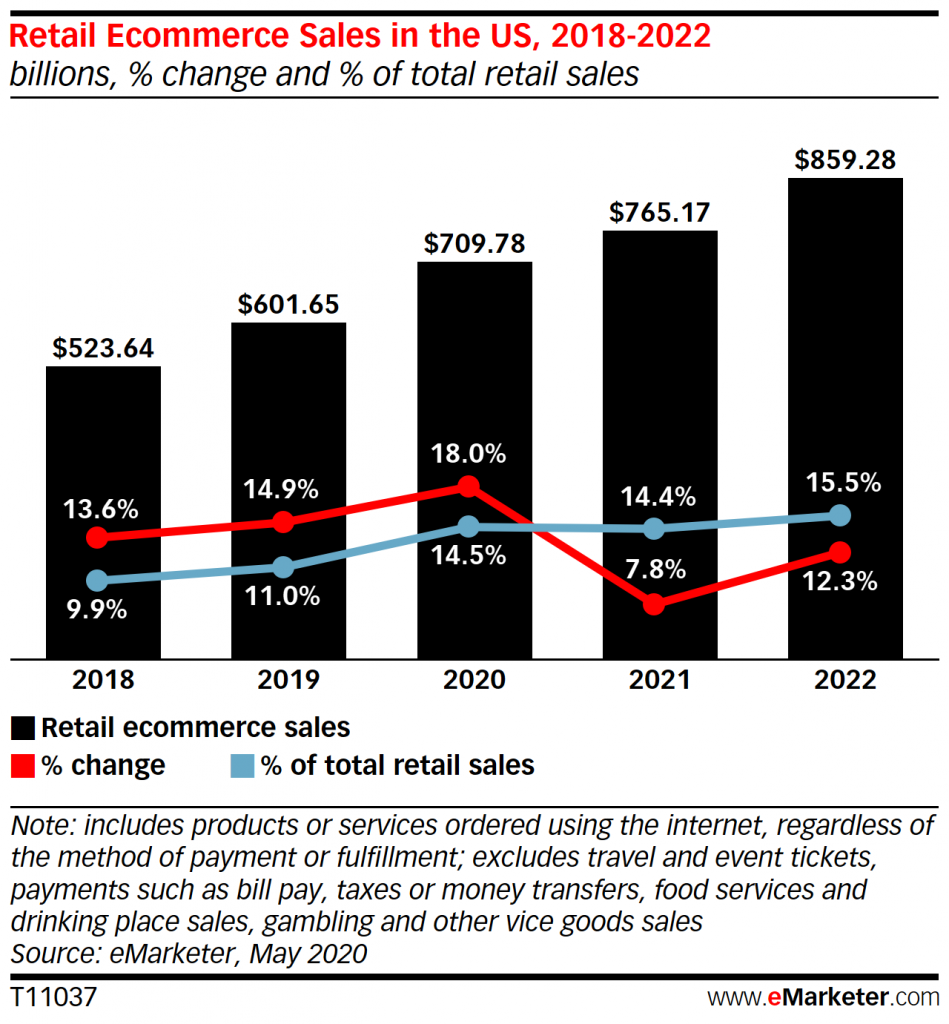
How can you position your company to benefit from the inevitable shift in the way we do business?
Position your website to receive increased search traffic to capture more leads and new clients. Execute a custom SEO campaign designed to drive traffic from keywords that are important to your business.
What is an SEO campaign?
An SEO campaign is a process that improves your website’s search visibility through improved rankings in keyword searches. It results in attracting visitors who are a match to what your business offers in products and services.
An SEO campaign provides the blueprint for developing your site in the major keyword topics that surround the inner workings of your business. As you build content that answers questions and educates visitors, your site becomes increasingly relevant to keyword searches.
As a result, your website appears in keyword-related searches from users at different stages of the buyer journey.
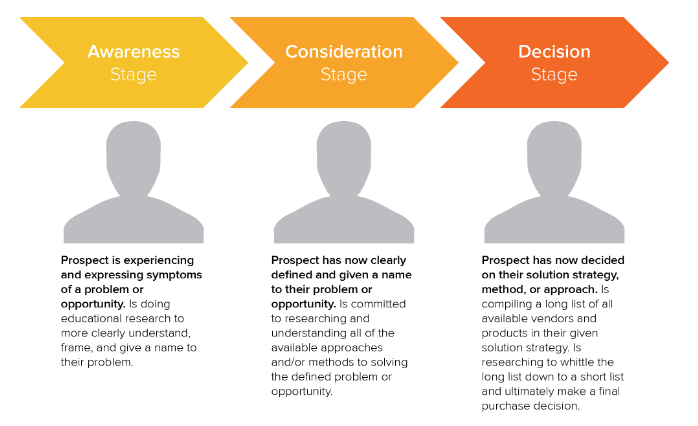
The goal is to create a website that has the ability to drive traffic, educate prospects and convert visitors to clients.
How to customize your SEO strategy and build an effective SEO campaign
The main focus of an SEO campaign is on the keywords you target and the content you publish. The largest ranking factor is being the best result to a search query. An SEO campaign builds the relevance of your page to the keyword topics and targets.
Understand your audience by researching your target keyword
Establishing search intent is crucial to understanding what it is that Google is using to rank pages highly in a search result. Keyword research is the first area that establishes the foundation of an effective SEO strategy.
What is the user truly expecting to find when they type in a search query?
Whenever you’re considering a keyword to target, the first action is to use that keyword in a search. The SERP (search engine result page) contains a lot of information that will point to what is needed to rank for the search term.
Reverse engineer the way other pages have achieved a top ranking to provide clues on how your site will outperform your competition.
Perform a SERP analysis
For every keyword search you will find the following on the SERP:
- The level of competition that competes for the first page
- The type of content that is being used to rank
- How pages are optimized to perform
- How many links are pointing to the ranking pages
- How Google displays the search result
- The commercial value of the search term
Establish intent
The first assessment is whether this term is a perfect fit for your company. If the pages that rank are all competitors that are offering the same product or service it confirms the relevance of the keyword to your business.
If there is a mix of results, consider a more specific search term to avoid unwanted traffic that wouldn’t be interested in your content.
Assess the competition
Using software and keyword tools becomes necessary in order to establish the authority competing pages have built. By identifying the number of links each page has pointing to it, where those links came from and whether they will benefit your site is the first indication of how realistic your keyword is to rank.
Build a list of alternative keywords
A search result can display many different features that are clues to what users are searching for when they search for your keyword. Establish commonly used phrases and keyword alternatives to build a better understanding of what the bigger picture is to the user’s true intent.
Read more on how to choose the perfect keywords for your site
Prioritize your target keywords
Keyword research will result in a large list of keywords, keyword synonyms and related search phrases. Prioritize your list in order of importance. Group your keywords based on search intent.
The result should be a keyword strategy that addresses the most important aspects of your keyword topic. This is the initial blueprint of a keyword strategy that lays the foundation for your content strategy.
Develop your Content Strategy
The approach you take on building content should be to provide as much information about your business by building a resource of information. The content you publish should answer common questions, provide insight and educate based on satisfying the intent of the keywords you target.
As your site becomes more successful in ranking for these terms, it increases the trust search engines place on your website for keyword related searches.
Map your content to match your keyword strategy
A visual representation of a keyword strategy is known as a topic cluster. Google ranks pages based on topical relevance. Connecting the ideas and concepts of your main keyword topic builds more relevance to your site and to the pages that are interlinked.

The pillar pages of your site will target the most important keywords. The clustered content will target more specific searches that serve connect visitors to your business by addressing the various details surrounding your keyword topic.
Read about how to implement pillar pages
Publish content that performs
The content you publish needs to serve the user’s purpose. If there are massive guides that are published on the first page of results for your keyword, it indicates the level of detail that’s required.
The Skyscraper method is a common approach to making sure your content is 10 times better than anything that ranks.
Using this approach ensures you cover the topics and subtopics necessary to address the intent of a search.
Read about how to write SEO content that ranks highly
As a local business, publishing local SEO content is a strategy that enhances your local search appearance.
Optimize for traffic opportunities
When your page ranks at the top of a result, it ranks for a number of different keywords. People use a number of different terms in a search-even though they are searching for the same content. Part of your content strategy includes optimizing for additional terms as well as traffic opportunities that exist in Google features.
Featured snippets and PAA boxes, for example, are considered and traffic opportunities because they are features that attract a percentage of clicks on the search engine result page.
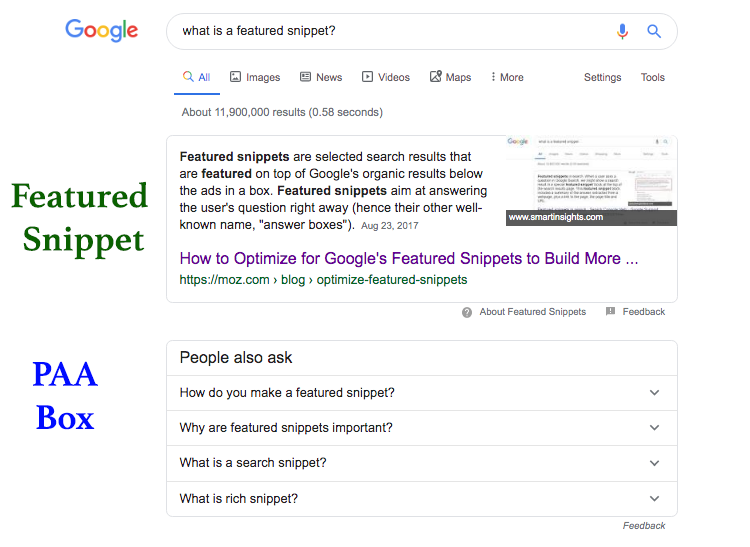
Optimize to appear in these features for additional traffic to the same page for multiple related search terms.
Link building strategy
Link building is necessary to get votes of confidence in the quality of your content. Well-placed links to your content build credibility and authority in your niche and industry.
There are a number of different link building methods you can employ, but regardless of what you choose the strategy should appear as natural as possible.
A common tactic employed is to assess your competitor’s links. By identifying where their links come from, you can pick up on a few links for your site.
Not every link on a competing page will be good for your ranking. In fact, there may be links pointing to their site that don’t help them and are hurting their ranking potential.
Choose to pursue links from websites that have traffic and whose visitors will be genuinely interested in your content. This approach helps to identify the sites that have a strong relation to yours and also get more people on your site that has a strong possibility to become clients.
Reach out to similar niche and authority sites
Most SEO campaigns require some level of outreach. In order to get links in the most natural way, it’s common to reach out to website owners who publish similar content.
The success of your link building depends largely on the quality of your content. When you have good content worth sharing people won’t mind linking to it.
Achieve goals and benchmark your success with your SEO strategy
Every SEO campaign should end with the goal of driving traffic to your site from keyword searches that serve a role in your overall keyword strategy.
Creating content that ranks is a primary function of traffic generation. With the right keyword strategy, your website will thrive from the flow of visitors that convert to clients.
Customize your SEO campaign to achieve keyword related goals and drive traffic that converts.
The Benefits of SEO: The Gift That Keeps On Giving
Search engine optimization is one of the top choices for business owners who are interested in the growth of their company. The benefits of SEO are quite numerous however the reality is that this online marketing strategy has become more of a necessity than a luxury.
The number of companies that actively invest in SEO is growing. In fact, 61% of businesses have stated that SEO will have a place in their budget in 2020 (up from 44% in 2018). With more companies investing in SEO, the leaders will keep leading and putting distance behind those who aren’t following suit.
SEO isn’t a quick process and with most SEO companies you have to pay before you play. At the end of the day, the benefits will far outweigh the cost as the process is essentially adding value to your website on a regular basis.
Here is an infographic on how the process works.
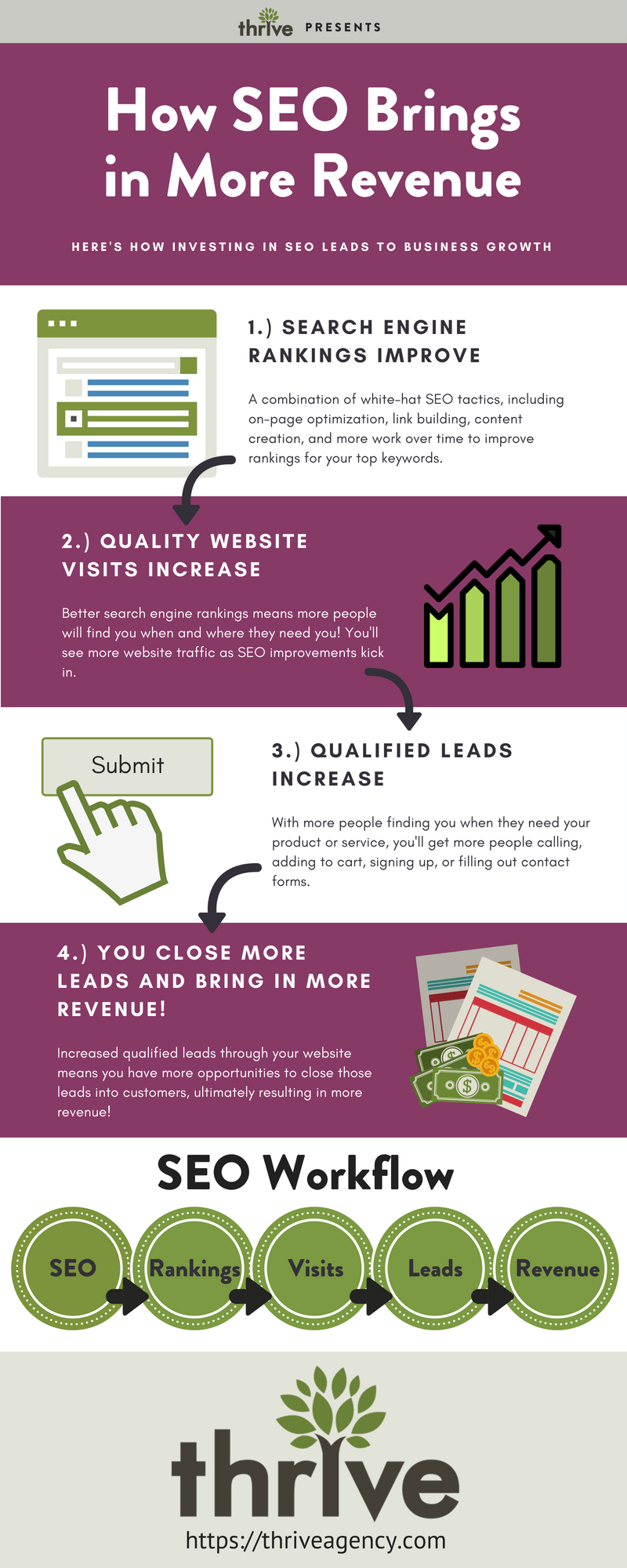
Here are a few benefits of SEO that will put your mind at ease when you make that inevitable decision to invest in the future of your company.
#1-Increased traffic to your website
In order to drive traffic to your website, your pages need to rank highly. It also helps to have a lot of relevant backlinks that can send your site traffic from relevant sources.
There should be no doubt anymore that search engine optimization is a necessary function for competing in the search results. Google recommends that website owners seek the help of an SEO professional to ensure the correct development of a website.
Implementing a custom SEO strategy will target your audience, optimize your content to get a higher ranking and drive more traffic.
#2-Increased development in your niche
A great deal of SEO is publishing content about the major topics and subtopics of your website or company. The process for publishing SEO optimized blog posts identifies areas in which users are showing interest. By addressing the most commonly searched problems by providing solutions, you develop your website to be a major resource in your niche.
As you build on the quality and quantity of content assets on your site it triggers more appearances in the search results for keyword related queries. This drives more relevant traffic that converts at a higher rate.
#3-Brand recognition
Most people prefer to buy from a brand they trust and recognize. Search engine optimization creates more keyword appearances for search terms that are related to your niche. The more a user comes across your website while doing their research, the more likely they are to trust your company.
#4-More new clients
The domino effect is in play when you increase rankings for important keywords to your business. The higher your page ranks, the more traffic is generated. Increase the number of visitors on your site and that results in more leads and new clients.
#5-Reach a targeted audience
One of the biggest aspects of creating SEO content is keyword research. A consultant goes through a series of routine checks to make sure a keyword will drive the right traffic. During the process, many related search terms and topics become apparent and thus become included in the strategy for optimizing a page for a keyword topic.
#6-Higher user engagement
If you’ve done your research correctly, your pages should contain all of the topics that a user is looking for when they search for your keyword. Competitive analysis of the ranking pages will identify what content or multimedia is working best to hold the audience’s attention.
#7-More leads on a consistent basis
The primary reason to optimize your website is to drive more traffic that is interested in what you’re offering. As you develop more content that is specifically for users on each stage of the buyer journey, your site becomes more capable of converting visitors along their journey. The results are more leads on a regular basis.
#8-Improves site structure
The structure of your website plays a role is the experience your users have-which, in turn, sends ranking signals to search engines. It’s important to have a site that allows a user to navigate easily from wherever they are on your website.
When a site is organized by topic, it makes things easier for users to experience more depth within your topic. The organizational structure referred to as topic clusters contribute to higher rankings for a specific keyword topic.
#9-Blueprint for growth
An SEO campaign will target a specific keyword and develop a page or multiple pages around that topic. A great deal of research goes into identifying the best keywords to fit the website’s strategy.
One of the greatest benefits of SEO is having a plan in place for driving traffic. When your company has an established blueprint for achieving specific goals, success can be measured, adjusted and accelerated.
#10-Increased revenue
New leads, new clients and increased revenue all fit into the same overarching goal. The whole point in investing money into your website is to make more money from the increased traffic.
One of the benefits of SEO is the fact it provides one of the best ROI’s in the marketing industry. What could be better being found by users who are actually looking for what you offer?
Conversions are higher than those of paid advertising. However, unlike PPC campaigns, when you stop paying for SEO services, your site continues to drive traffic, leads and new clients to your business.
#11-Alternate stream of income
For companies whose sales have traditionally been in person, SEO can offer an alternate stream of income once they make products available for purchase on-site.
This additional revenue can overcome the inconvenience of distance for many potential clients. This can open up entirely new markets that would have otherwise been unattainable.
#12-Contactless service
Selling products online allows companies to continue making sales; even while regular store hours are closed. A website that ranks for transactional keywords can make money 24 hours a day, 7 days a week.
Ecommerce is a quarantine-proof business if your products are also quarantine-proof. Another one of the benefits of SEO is that it connects customers and vendors despite any types of restrictions or limitations placed on physical interactions.
#13-Reach a larger audience
Search engine optimization allows your business to expand your audience. There are no physical limits. As long as your products or services are consumable by a global audience, the world is at your fingertips.
#14-Improve your online presence
When your company, brand or any keyword related search is made, you want your website to come up in the search results. Improve your online presence for anything related to your niche through a variety of platforms and practices. Options include but are not limited to content marketing, guest posting on high authority sites, expanding your social network, starting a YouTube channel.
#15-Enhance your local presence
As a local business, you want your neighbourhood to know about your company and think of your business when they need something you offer. Local SEO is all about improving your search visibility for localized searches of your products and services.
At least half of all searches made on Google are to obtain information on a local business. Local SEO in Toronto contributes to as much as 80% of businesses total revenue. This is one aspect of SEO that can’t be ignored by companies that offer local services.
#16-Explore a variety of traffic sources
Search engine optimization gives you the option to explore different sources of traffic. There are different search engines to optimize for, paid ads, local pack ranking, SERP features and social media marketing. YouTube, Amazon and even Facebook and other social sites are considered their own search engines, which gives companies more options for sources of traffic.
#17-Identify technical errors on site
Technical SEO can help your website by making pages accessible. Issues that affect your ranking are page speed, duplicate content and indexing issues. An SEO consultant will catch those problems and correct them before they snowball.
#18-Adapt to changes in the algorithm
Google is constantly updating its algorithm, which makes it impossible to stay at the top of a search result without proper maintenance. It is said the Google updates at least twice daily, with around four major updates a year.
An SEO professional can guide you in the right direction when major updates occur. If your ranking suddenly drops, you have someone to source the issue and get things back in order.
#19-Avoid/reverse search engine penalties
Many business owners will make mistakes that could cost them their website’s entire search visibility. For example, unnatural link building can result in your site’s removal from Google’s index altogether.
Ethical SEO experts are able to navigate around the penalties and filters that Google has set forth that would impede ranking and search visibility. It’s one of the benefits of SEO services provided by a professional. The steps to reverse a penalty are often more complicated than what an inexperienced person should undertake.
#20-Identify opportunities
The search results offer many different traffic opportunities that you can pick up on if you’re looking for them. SEO is the combined effort of a lot of smaller moving parts. Capitalizing on opportunities as they come can result in the top ranking, increased search visibility and a bigger bottom line.
How to Outsource Freelance Writers For SEO Content Creation at Your Website
You want your website to grow in traffic and become a brand.
You want it to win SERPs, get backlinks, and – sooner, rather than later – convert.
For that, you work hard on crafting your website. UX design, colour psychology, UTP, on-page SEO, and social proof are all very well; and you already know who can help you with that. But the most powerful weapon to help search engines see you and communicate your brand message to consumers is… yes, it’s texts. Outstanding SEO content that would not only contain tons of keywords but also engage people, translate your tone of voice, and encourage them to click and buy is what you need right here and on a regular basis.
Savvy freelance writers would solve the problem.
Benefits are many: You save time and money, you don’t spend resources on workplace organization and training of full-time employees, and you get compelling content that drives organic traffic and works on your brand reputation.
But there’s also a reverse of the coin:
Looking for freelancers, you may face irresponsible performers who miss deadlines, ignore instructions, write poor texts, or disappear once they find a client promising to pay $1 more than you. Outsource is about the interaction of expectations, collaboration, insights, and personal traits: As an SEO specialist or a business owner, you want them to be cheaper and faster, while they want to write longer and sell texts higher.
To balance the process for a win-win, learn how to outsource freelance writers for your SEO content and how to work with them like a boss.
Where to Look for SEO Freelance Writers
Corresponding websites are many. Freelancer, Upwork, Guru, People Per Hour, Fiverr – each of them has its own approach but the same essence: post a job description, start receiving proposals, compare candidates’ profiles as well as ratings, prices, and portfolios, and hire those fitting your expectations and business needs most.
Tip: Don’t ignore freelancers living and working outside of the US. They work just as well as native-speaking SEO writers but may cost you less, so pay attention to professional background and experience rather than the country.

How to Choose an SEO Writer
Sad but true:
Most people believe they can write.
Indeed, five in ten are bloggers today, posting to Facebook or Instagram with hundreds of likes and shares, which inspires them to practice freelancing or remote work and earn extra money. Good luck to them.
But when you come to find a professional who would create compelling SEO content for your website, you have to thread your way through the tons of their profiles… And you simply get lost there.
How to save your time, nerves, and money? How to understand which writer can deliver your keywords, search intent, and business message, not just put words on paper?
Pay attention to these aspects:
- A writer is able to meet deadlines.
- A writer is creative, with writing style and voice, but also adaptable i.e. able to follow your instructions.
- A writer’s texts are thoughtful and well researched.
- A writer is flexible, able to deliver SEO content when you need it or revise it according to your feedback.
- A writer is accurate and attentive to details: They know the principles of critical writing, format texts properly, avoid most common spelling and grammar mistakes, design content from scratch, and clearly understand what you want from them.
The questions gathered by Corey Wainwright at HubSpot will help you understand if a particular writer meets your business needs. Ask them before hiring.
How to Organize Your Work with SEO Writers
First and foremost:
Make it clear for a freelance writer what you want from them. In other words, craft guidelines right and avoid quirky mistakes while training a writer.
Details to include in your guidelines:
- Target. Tell a writer about your small business and its target audience, as it will help to create engaging content. Specify a type of content you need from a writer – informative, entertaining, or marketing. Also, explain what message it should communicate to the audience. Include all necessary keywords and search intent for a writer to understand your target audience better.
- Task itself. Include information on formatting and visual elements: how to format headings, lists, citations; paragraphs length; what links to include if any; what words to avoid (if you have a brand style guide, share it with your freelance writer so they could understand your tone of voice better); experts and resources to refer; a deadline.
- Comments. Share some content assets for illustrative purposes so a writer could see what you expect. Encourage SEO writers to check a completed task for plagiarism to avoid duplications and unintentional rewrite. Give contacts of whom they could address for comments.
To save time and resources, organize your work with freelance writers effectively.
- Work in Google Docs, as it’s among the best resources to access and manage fast.
- Create a separate folder for your freelancer to save all texts there.
- Write a strategic plan, and share its part about the content with a writer so they could see deadlines in advance and organize their work time properly.
- Create a separate doc with all keywords, formatting rules, and guidelines so a writer could refer to it whenever needed.
- Discuss payment details in advance; and, plan deadlines smart: Save some time for revision and edits.
And last but not least:
Don’t forget to control your freelance writer’s work for better efficiency. How much time do they spend on one task? How many tasks do they complete within a definite period of time? How many are still pending a revision or already expired?

Google Calendar and Google Sheets are free yet compelling tools to control an SEO writer. Add tasks, change their status, leave comments for a writer to revise texts accordingly, and analyze their working efficiency with formulas.
Also, you might want to try a specific software, developed for business campaigns management. It analyzes completed tasks, grades them, regulates communication processes, generates reports, calculates expenses for every writer, and more.
Once organized, the work with freelance writers will save you tons of time and costs for SEO services. And nerves, which is sometimes worth more than monetary rewards, isn’t it?
Are you looking for SEO expert jobs? Find out more at Jooble.
How To Build Local Links To Attract More Clients
Local SEO is a crucial part of any business whose clients are mainly sourced from a specific location. In order to take advantage of high converting local traffic, it’s important to optimize your website for a specific location. Build local links to improve your local search presence and drive more clients to your site from a specific location.
Building citations from directories and encouraging clients to leave a Google review will only get you so far. It’s important to acquire as many local links as possible to fuel your site’s local ranking ability.
The more ties you have to a locality with quality links, the more you’re able to demonstrate authority in your keyword topic and city.
Link building involves acquiring a wide variety of links that aren’t necessarily from high domain authority sites. The most important aspect of local link building is that your links come from relevant sites (niche specific) and are related to the area.
Major directory local link building
The best way to pursue link building is to build links in a way that is natural and logical. When a company first opens its doors for business, among the first logical places to get listed is in the city directories that locals are using.
Google Local Finder
One of the major directories that are obvious is Google’s local finder. The local pack (the three listings that Google highlights in a local search) is an excellent source of traffic for generating local leads.
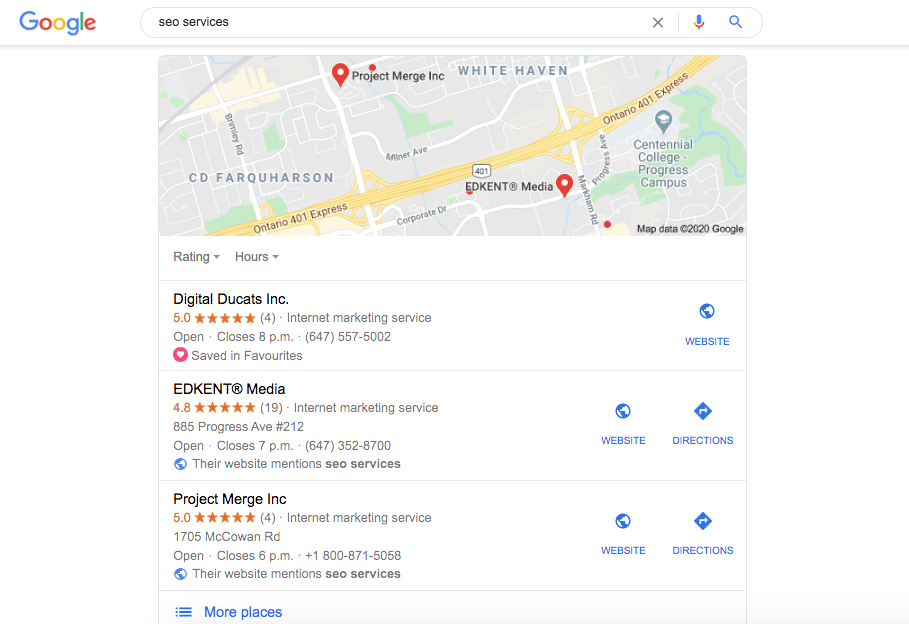
You can sign up to be found in Google’s local finder by optimizing a Google My Business profile. Use as much information as possible so that your site will be eligible for as many different types of searches as possible.
Bing local places
Bing has the second-largest share of searches as far search engine market share goes. Listing your business here is not just for that fact, but for the validation that Bing provides to your Google listing.
In order to optimize locally, your site should be sending as many ranking signals as possible. Confirming your name address and phone number across major directories strengthens your local ranking in Google’s local finder as well as localized search results.
Use the option to synchronize your Google My Business account information with Bing. Any changes made to your Google account will automatically be updated in Bing. Not only is this advantageous to maintaining your ranking signals through identical NAP details but it saves you time from filling out all the information again.
Yellow pages business | Local business marketing solutions
This is another major directory that your business will benefit from being listed. Yellow Pages has a dozen other affiliate sites that collect your information from their database. If you’re listed on Yellow Pages you automatically get listed in other directories that will add to validating your local presence.
City-specific directories
The next tier of directories you should pursue is those unique to the city in which you are ranking your website. Create a listing in directories that receive traffic and which people are actually using to find local places.
You can search for city directories by typing in [your city] + directory. Vary your search by typing [your keyword] + [your city] to see what directories are ranking for that keyword. If a directory shows up in the first few pages of search results, it’s a good indication that there’s value in listing your business in it.
Niche-specific directories
The same concept should be applied to niche-specific directories. Be more selective about the directories in which you create a profile. Low-quality sites may have an adverse effect on your ranking. Search for niche-specific directories by typing in [your keyword] + directories to get a list of options.
Unstructured citations
These types of links are considered to be the most valuable for building a strong local link profile. An unstructured citation is a mention of your company on a site that doesn’t specifically have a place to fill it out.
You receive structured citations on directories, review sites and other sites that provide a specific place for listing your information.
If a company mentions your website on their blog, it’s an unstructured citation. It is much more difficult to acquire backlinks such as these which is why they are so valuable. They represent a true vote of confidence in the credibility of your company.
How to get an unstructured citation
It all boils down to outreach. To get another site in your city to mention your business, you need to ask the site owner to link to your site. This is most likely to happen from clients, vendors or businesses in a close vertical to your own.
Obviously a direct competitor isn’t going to want to send traffic to your site. Look for companies in the same city that offer related services and products. You can form a coalition of sorts to help promote each other’s business with a link arrangement or content collaboration.
For example, if you own a restaurant the bakery in which you get your dinner rolls would have no problem linking to your site. They have a vested interest in your success so they are an excellent link prospect.
In many cases, you may need to be creative with the ways you acquire your backlinks. One option is to create content for another site’s blog. Infographics typically have more leverage because of their visual appeal.
Related reading: A Crash Course In Broken Link Building
Resource page link building
Discover local sites that have published resource pages that list links they have found useful to their business. Website owners will often link to their vendors, suppliers and other organizations that are related to their products and services.
You can use the search operator “inurl” when searching Google to display sites with a specific keyword in their URL. Most resource pages are titled “Resources”, “Links” or Resources and Useful Links” so the URL will typically reflect those keywords.
To find these pages type into Google searches such as:
[your keyword] inurl:linksor
[your keyword] inurl:resources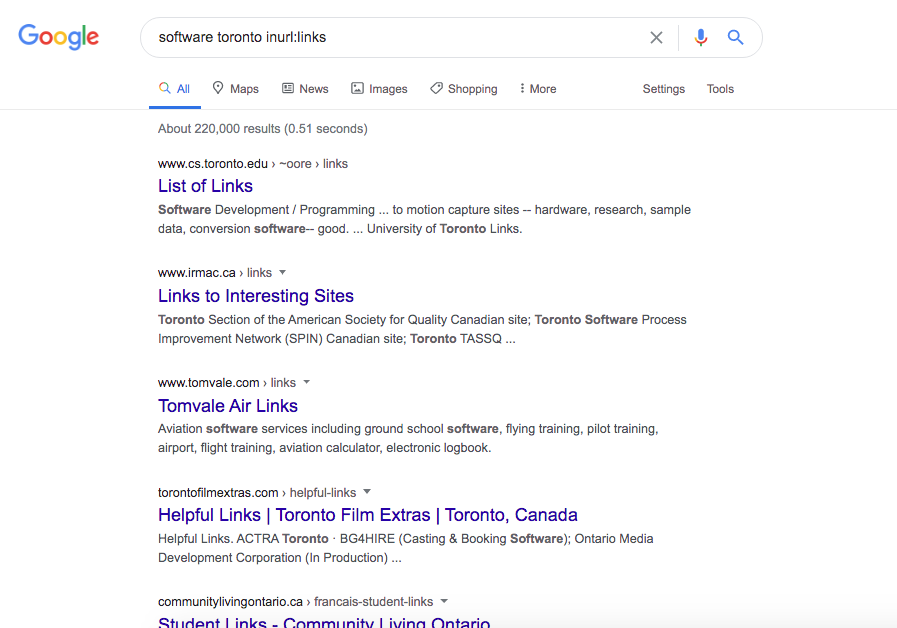
Choose sites that are relevant to your site and would be a good match for the link prospects list of resources. Having a resource page of your own can help leverage your success rate, however, keep in mind that too many link exchanges may trigger an unnatural link pattern.
Related reading: 9 Effective Backlinking Strategies for 2020
Local charities and organizations
There are many organizations that list the names and websites of sponsors who have contributed to their cause. Making a donation to these sites can earn you a spot on their list.
You can also donate products and services to those that will benefit from your offering. For example, if you’re a web designer you could offer to revamp a local charity website. The likelihood of the organization allowing you a link from their site goes way up with acts of generosity and kindness.
Job postings
Post a listing for a job offering on local sites. It’s an easy way to tie in your business with the city in which you’re trying to rank.
Host an event
Use sites like Meetup to host local events. Not only will you build local links from the event your posting on the site, but also it’s a way to build new connections with businesses in your area.
Local newspapers
If you have some newsworthy content to promote, local newspapers can be an effective source for local links. Whether it’s an event your hosting, or news that the community can benefit from, a link from a local newspaper will get your site in front of a local audience and contribute to your local ranking.
Review sites
Apart from the biggest review sites such as Yelp, every city has websites that are frequently viewed by locals who are researching businesses. Get your site listed here and encourage people to leave reviews about your services. These sites are specific to your city and will anchor your site as a local business in the area.
Build your local presence with local links
Local businesses do not typically have extensive high authority link profiles. It’s just not common for local businesses to invest large budgets into SEO content and link building campaigns. Most local businesses acquire natural links through directories and sites that are native to the city in which they do business.
Plan to build local links from a variety of the above-mentioned sources. Local links are the most powerful sources when it comes to appearing in local searches.
Related reading: Claim & Optimize Your Bing Places For Business Listing
Don’t overdo any one type of link and maintain a natural acquisition of links throughout your campaign. Building 100 directory links in one day is not a natural link velocity.
As one of the highest converting sources of traffic, the local search results will contribute to the revenue your business generates.
Increase the number of local clients your business acquires with local SEO services in Toronto. Build local links to improve your local ranking for keywords that are vital to your business.
A Crash Course In Broken Link Building
Broken link building is just one of many backlinking strategies used to acquire links to your website. The short summary of how to execute a broken link building campaign is:
- Find a website that would be ideal to link from to your site,
- Identify any links on the site which are broken (the target page no longer exists)
- Create content to replace the link
- Contact the site owner to have the link replaced with your own
In a recent outreach article, I asked Brian Dean what strategy he thought was the most effective link building strategies for 2020 and broken link building was his immediate response.

Brian, who is one of the industry’s most well known SEO’s, boasted a 10% conversion rate on his latest campaign. This is an important point because when you set out to accomplish your link building campaigns you should set some realistic expectations.
Most people do not welcome email that essentially is a request for a link. If you’ve ever run an outreach campaign, it can be frustrating at times with the response you receive. If a 10% conversion rate is an above-average result, you can expect to hear deafening silence from over 90% of the webmasters you contact.
This is what makes broken link building a more attractive method of acquiring backlinks. Your outreach email is based on providing value for all parties involved.
- The website owner improves the UX and the SEO of their site
- The users are not taken to an error page
- You receive a juicy backlink
Automate broken link building with software
The best way to go about broken link building is to automate the process with software. Ahrefs seems to be the best option for identifying broken links because their software will scan an entire website and list every link that is broken.
The poor mans version of this process would involve a manual discovery whereby you would be required to go page by page and use an extension to highlight broken links. You can download an extension such as broken backlink checker (a bit out-dated) or check my links (recommended), both of which you can find in Chrome.
Build a list of prospects
The best option for the most success is to target sites that would have a lot of links pointing to their pages. You want to be able to find a broken link that not only one site owner will be happy to replace, but a number of site owners. If there is a missing page that 100 people have linked to, your chances of acquiring links go way up.
Make a list of the top sites in your industry. Shoot for the stars. Target domains with high authority and decent amount of traffic.
Plug your prospect site into Ahrefs and click on the inbound links. You can then click on the broken link tab to pull up a list of links that need replacing.
Choose topics to compliment your niche
When you’re looking at links to replace you will need to choose content that best suits your specialty.
Find links to pages that you are able to write quality content unless you’re outsourcing a freelancer to do your writing.
Although you are bringing a broken link to the attention of the site owner, you will still need to provide a good piece of content that will earn the link.
Hindsight is 20/20
If you’ve never used the Wayback Machine, get ready for journey back in time. This particular marvel of a site will show you what the page used to look like before it was deleted or moved. This is an important part of the process because you need to set the standard for the content your replacement page will need to cover.
Assemble the troops
Now that you have content that rivals your successor, you will need to get it in front of those who have linked to the page. Type in the URL of the broken link into Ahrefs and get a list of the sites that are linking to that page. You now have your list of sites to approach for link replacement.
Find the right email addresses
This part of the process can be automated with software like Hunter. Hunter offers a free option but if you want to find hundreds of email addresses in one fell swoop you can opt for the paid version and upload the list of websites.
You may want to rifle through your results in order to make sure you are sending your outreach to the right person. List your prospects on a spreadsheet in order to set yourself up for a template email approach.
Automate your outreach
Ninja Outreach can be your best friend for saving time in the outreach process. Your approach to contacting webmasters is already packed with value so make your email as simple as possible. Here is an example of what will get the best response.
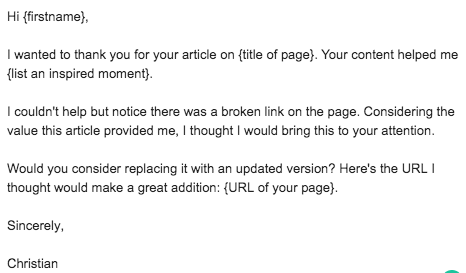
Pay it forward
One twist to this method that many SEO’s overlooks is the potential to appease the fourth party. Everyone in the broken link building method seems to win-except one. The website who lost the link.
You can pay it forward and show appreciation for their loss by linking to their content. By giving the previous link holder a link from your content you really are creating a winning situation for all parties involved.
Conclusion
Consider the number of people who are spamming sites and asking for favours and this method of link building becomes more attractive by showing upfront value.
The truth is you can scale up your link building by using this strategy as opposed to the more time-consuming methods, such as guest posting.
As one of many tools you can use in your link building arsenal, broken link building tends to get a higher response rate than simply asking someone to link to your content.
Don’t be discouraged by dismal response rates. Outreach, in general, is riddled with a lack of response. The average conversion on an outreach link building strategy is somewhere around 8%. If you can get to that number or above, you’ve outperformed the standard, cleaned up the internet and acquired some juicy backlinks for your site.
Related reading: How To Write SEO Optimized Blog Posts
Whitby Local SEO Tactics To Rank On First Page
The growth of your business is not something that should be left to chance. Take control of the future of your company by making sure those that are looking for your products and services can find you. Strong local SEO will get your site ranked highly on Google for local search results. Whitby local SEO is one of the go-to sources for lead generation and new clients for a local business in Whitby.
The value of appearing in the organic local search results is obvious. Why not be found by people who are actively searching for your product? No matter if you’re a new business or have been around for years, you can increase the number of people who find you by improving your SEO.
The fastest way to make this happen is to hire an SEO company in Whitby. However, if you’re feeling brave enough, here are two major tasks to accomplish to make your website rank higher in the local organic search results.
- Optimize your website
- Build local backlinks
Improve your on-page SEO for searches in Whitby
The process for optimizing your website starts by making sure you have adequate content on your website. One of the biggest hurdles to overcome is making sure you have covered the content topics of your business. The ultimate goal is to answer every possible question a visitor may have who lands on your site by publishing local content about your company and what it offers.
Part of this process requires building a blog with linkable assets. Not only does this serve as a resource for your clients and potential customers, but also it gives other websites a reason to link to your site.
Google bases a large part of its ranking criteria on the trustworthiness of your site. Is your site credible, authoritative and considered a source for expert opinion? Building a blog that generates traffic and backlinks demonstrates these qualities.
If you are knowledgeable about your business and can publish content to teach people about it in an organized manner, you are about halfway to owning a website that ranks highly. The two biggest areas to spend time on will be your content and backlinks.
Use as many optimization tactics as possible to improve your on-page SEO. Once you have built an optimized website, the final task to improve ranking ability is to acquire quality backlinks.
Whitby local link building strategy
Competing on a global level allows you to find websites from anywhere in the world to link to you. The challenge is how to get the websites with the greatest amount of authority to link to your site. This is the same concept for local SEO but within your target city.
A local business can use links from around the world to build authority to a website, however, they don’t have the same power to create a local presence. Acquiring links from websites in your target city are the most powerful backlinks for ranking in that city.
Think of links as referrals
A link from another website is similar to a referral from another business. Collect the most trusted types of referrals for your website to see the greatest gains in your site’s ranking. The more quality referrals your website acquires, the more convincing it is to search engines to rank your site closer to the number one position.
Let’s assume that you are in the market to buy a swimming pool. You ask two people for referrals on who they believe to have the best reputation for quality. One of the people you ask runs a bakery, and the other is another pool manufacturer. Whose opinion do you think would be more knowledgeable?
Obviously the person who is in the same industry should have more insight into the business. Think of the links you acquire from websites in the same way. The more relevance your links have to the keyword you are trying to rank for, the more powerful they are in moving your site to the top of the search results.
How do I find local sites in Whitby to link to my website?
The beauty of local SEO is that you can limit your search to the city you are trying to rank highly in. Resource page link building is an effective strategy to find sites that have pages that link to useful sites, suppliers and vendors. Here’s how you can execute a resource page link building strategy.
Create a list of link prospects
There will obviously be a tiered level of the quality of links you will find, so your first task will be to make a list of prospective links to choose from. You can start your search by typing the following into Google:
[your keyword] + [your city] inurl:links
The search results will list websites that are associated with your keyword and city and have the word “links” in the URL. For example, if your company does landscaping in Whitby, this would be a search you could perform to find relevant links:
landscaping Whitby inurl:links
To produce these results:
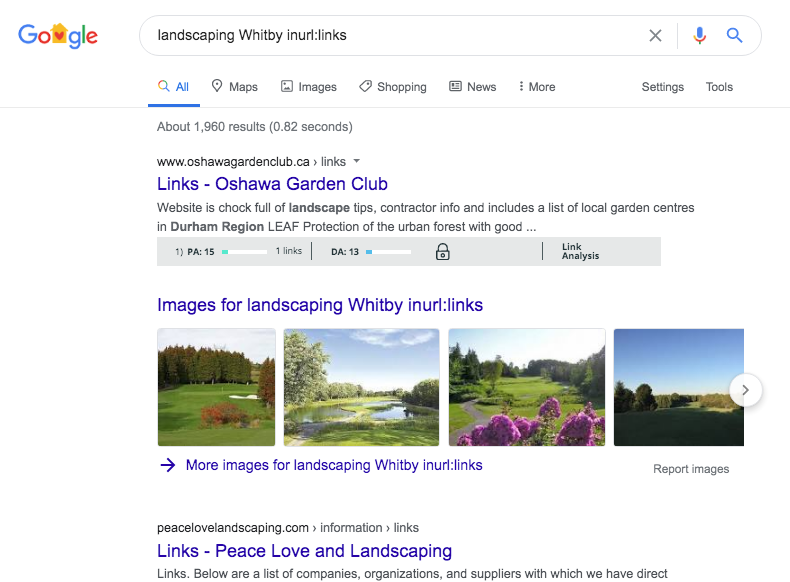
If you take a look at the first result, it is a site located in Oshawa, which is next to Whitby. This means it isn’t the best type of link if you’re targeting Whitby however, it is extremely relevant because it’s the next town and it’s a gardening site. This is a link prospect you would want to pursue.
You can repeat this search replacing variations of your keyword to generate different results. You can also replace the word you tell Google to look for in the URL with another probable word such as “resource” or “resources”.
[your keyword] + [your city] inurl:resources
The goal is to get links from the sites that are closely related to yours. If there is a slight connection you can still use those types of links to tie in your website to your city for a stronger local presence.
Tier 1 vs. tier 2 links
Separate your list into two tiers based on the relevance of the link prospect. If the website is not in your industry but is in your city, you would consider it a tier two link. Your first tier consists of the websites you will contact first because they are in your city and relevant to your business.
Make contact with relevant sites
This stage of the outreach process is the first of a two-pronged approach. You want to make contact with the website owner first before you go asking them for favours. At the end of the day, you’re asking other sites to give you a link so you don’t want your first impression to repel the owner or for your email to be dismissed as spam.
Here is an example of an email that will get your prospect warmed up to the idea of giving you a link to your site simply because you aren’t asking for anything.
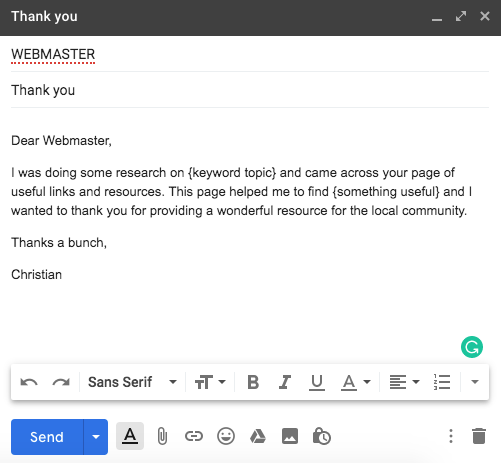
The ask
Once you’ve sent this email, follow up with a second email, asking for the link to your site. What is proven to do wonders for your success rate is to offer value to your prospect as a way gaining more favour and encouraging them to give you what you want.
Avoid link exchanges
Try to avoid reciprocal links. A few instances of where you link to another site and they link back may not harm your site, but too many link exchanges may have an adverse effect on your site’s ranking. It’s ok to engage in a few, but if your backlink profile is all link exchanges, you run the risk of being flagged for unnatural link building.
Offer value by finding broken links
One way to offer value is notifying the prospect of any broken links to their site. By using the Chrome extension “broken link checker” you can quickly identify any broken links on the resource page and let the webmaster know about it.
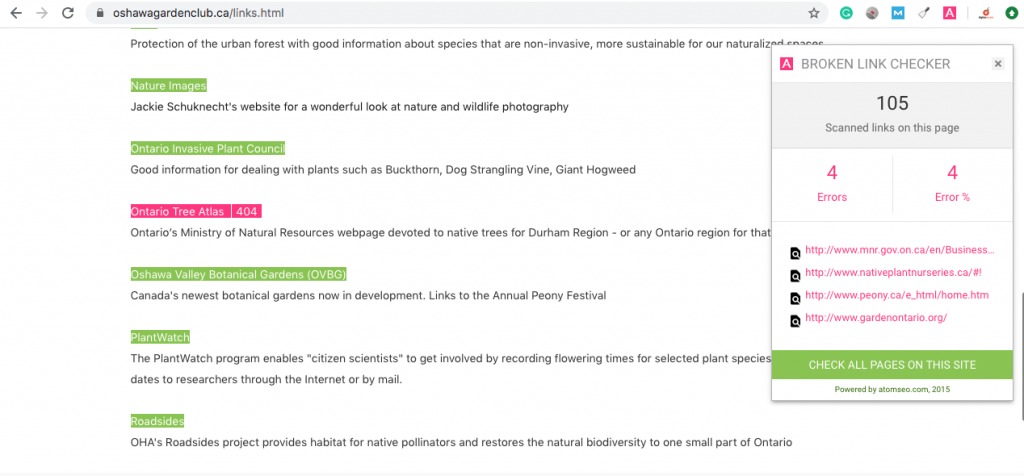
Your next email can go something like this:
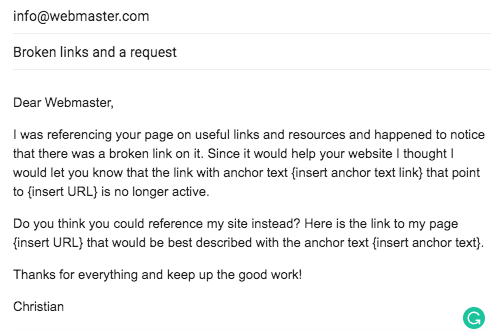
Follow up
Make it a point to follow up on your link requests to make sure your emails were not in vain. It may turn out that the Webmaster has added your link but hasn’t bothered to respond. Check the resource page before emailing a follow up email.
In some cases, it may even work out better to pick up the phone and call. If you can get to the right person who makes the decisions on the website you can get a straight answer. It helps to add a little personality to your efforts-just make sure you aren’t’ too pushy.
Gauge your results
When you get a link to your site, gauge your results. It should only take a day or two to see the effects of your link. If your niche isn’t that competitive you may be able to see large gains in ranking with just a few links. At any rate, the number of relevant local links you acquire will have the greatest impact on moving your ranking.
Resource link building is a Whitby local SEO strategy that is highly effective in getting your website found in the local organic search results. Explore what your city has to offer in terms of the resource pages offered by local businesses. You may be able to form alliances and make the connections with the companies that will catapult your website to the first page of Google.
How To Use Cambridge SEO To Increase Revenue
The way we do business has evolved substantially over the last decade. Most people are completely reliant on their cell phones for making purchase decisions. From researching a product or company, comparing options and then finding a location to make a purchase-it’s mostly done by searching Google. Your business can benefit from being found in hundreds of searches by investing in Cambridge SEO.
Spend time identifying how people search
The first major step in creating a site that generates traffic is to perform adequate research in finding the right keywords. Keyword research has become the new market research.
It’s not just finding high volume search terms but also finding out what keywords are closely related, what is most likely to be searched within the topic, and the most trending issues that are commonly searched.
Cambridge SEO is somewhat simple if you know how to get the most out of your website by targeting the right audience. You can come to a fairly accurate assessment of the most beneficial keywords to your company by performing some simple searches and using free tools available to everyone.
Brain storm a list of options
The first step is to list the terms that you believe your company will benefit from the most. This step should typically be a list that describes services and products.
Type each of those potential keywords, into Google
Immediately you should get a drop-down of other popular searches, however, those same keywords will appear at the bottom of the page after you hit enter.
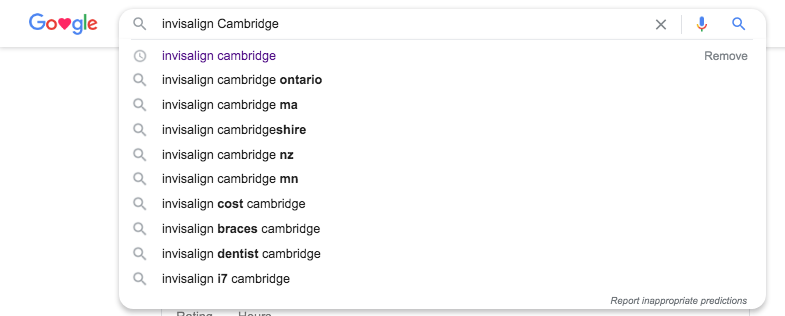
There are two things you will need to check on a search result page that will indicate the relevance and difficulty of the keyword in question.
Qualify your keyword based on the competition
Are the list of sites that appear direct competitors with your company? If a keyword is truly valuable to the industry in which you compete you should see the search result listing populated by companies with similar offerings to your own. This would indicate the keyword is a term that will generate traffic that converts to clients.
The second indication that the list of sites will indicate is the level of difficulty that your keyword represents. Are the major competitors in your industry ranking in the top 10 spots? Have these websites been around for years? Do they have hundreds of backlinks that may prove difficult to acquire within an acceptable timeframe?
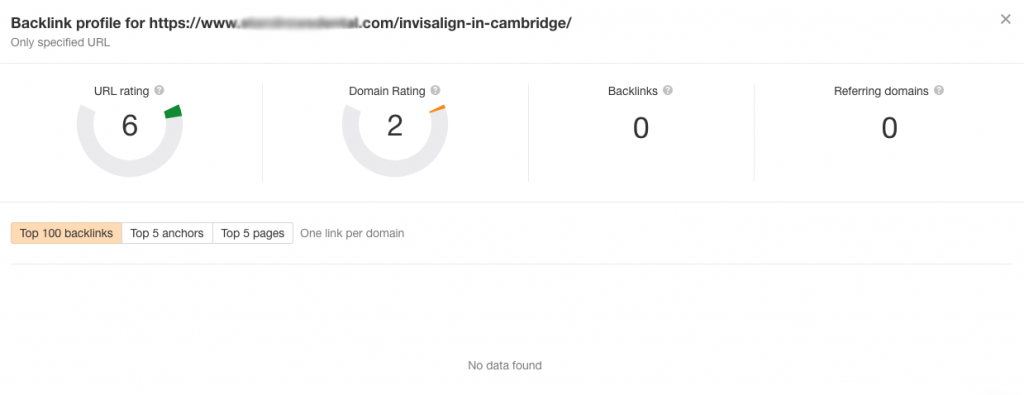
You can check the backlinks of any website using Ahrefs free backlink checker. It’s probably the best at producing the most comprehensive list of backlinks. If there are backlinks that you can also acquire, it’s one indication a top ranking for that keyword is attainable.
Google SERP Features
Another area of improving your Cambridge SEO is assessing the type of Google SERP Features (SERP=search engine result page). Google uses approximately 20 different features on the first page of results to make information easier to find.
The major features that are most commonly found are the Local Finder, Google Ads, Carousels (video, advertisements, shopping, images) and knowledge panels.
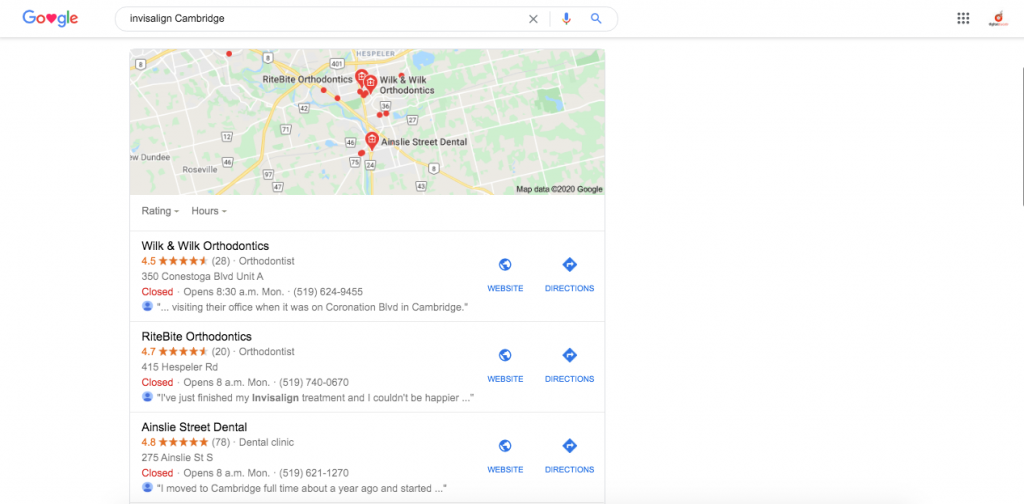
If any of these features appear for your keyword search, it is a consideration you have to make because each of these features affects how traffic distributed in a search. Each feature requires different optimization to get your company to appear in them.
Optimize your website by creating content for users-not robots
The easiest way to optimize for a keyword, is to create content that completely satisfies the user’s motivation for performing the search. Whether it’s on the informational level or transactional level, creating content that satisfies user intent is a major ranking factor that will have a large impact on your websites ranking.
Google will also take into account the content on your site that supports the keyword you’re targeting. For example, if you’re targeting toothbrushes then it would only make sense that you would address the topic of toothpaste somewhere in your content.
Why does this matter?
When people search for toothbrushes they are likely to be interested in toothpaste. It’s a part of the bigger picture in the keyword topic. You can’t brush your teeth without either so they are both related content topics.
The chance is if you’re an expert on toothbrushes, you should have something to say about toothpaste as well. Google loves expert opinion because people are more likely to find the best information from an expert.
A user-centric approach to content creation will lead you in the right direction. When you think of your clients, and what they want and need to read about, you’re able to map out the most effective content for your site.
Of course, there are many aspects of on-page optimization that need to be accounted for in order to break any barriers of communication with the search engines. There are dozens of ranking signals you can send to enhance the optimization of your page and make it more competitive in the SERPs for a target keyword.
Connect and promote your pages
When you’ve published content the next phase of development is to connect and promote your page by linking to it from websites that improve your ranking. Just as Google has become more accurate in determining the context of your content, they are equally as good at determining the quality of your backlinks.
The simplest approach to acquiring good backlinks is to link from websites your potential clients would likely be on. That means that even if you’re not sure about link metrics and how search engines view it, create links that will allow you site to be found by people who would be interested in your services.
If you’re a local business, acquire links that tie your site into your location. Links are meant to improve your credibility and authority. Link from sites that will improve your website in both departments.
Avoid linking from low-quality sites may be considered “spammy” as those types of links will have an adverse effect on your site. That means limit the directory links you build and avoid article directories or any “easy to get” backlinks.
Generate more business in Cambridge with an optimized website
The truth is, it is becoming increasingly difficult to rank highly for the best search terms that will bring in the most money without optimizing your website. Google itself recommends hiring a Cambridge SEO expert in order to make sure your website is able to be found.
There are so many ranking factors to account for when competing for a difficult keyword. Invest in SEO in Cambridge to ensure your website is on the right track to appear in searches that lead to new clients.

